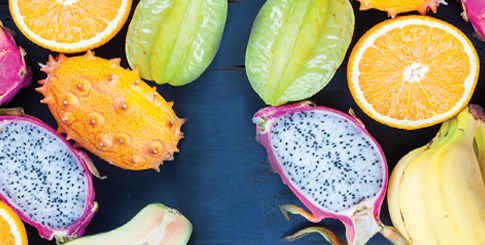Ramos also imports a great deal of product from Central and South America. The company began its season in late summer with “good volumes of air and ocean [shipped] asparagus from Peru, and mangos from Brazil.” Next were blueberries from Argentina, then Peru, before moving into Chile.
Tempting Tropicals
Whether locally produced or internationally sourced, the desire for a wide array of tropical produce remains unabated. Once an ethnic specialty, many exotic fruits are carving a strong niche for themselves, showing up on supermarket shelves and driving increased curiosity and consumption.
Locally, grower-shipper Ecoripe Trop-icals focuses on tropical fruit from the Homestead growing region, where Holbik says South Florida’s subtropical climate is a perfect match for exotics.
The region’s agricultural superstar, Miami-Dade County, is the number-one U.S. producer of mangos, carambola, lychees, longan, mamey sapote, bananas, plantains, atemoya, coconut, sapodilla, jackfruit, and passion fruit. It also ranks fifth in the nation for avocado production, with more than 10,000 acres devoted to tropical fruit.
Rosann Cabrera, general manager for importer-exporter Bayshore Produce, LLC, handles as much local or ‘Redland Raised’ produce from Miami-Dade as possible. Although it doesn’t make up a large portion of the company’s product line, she’s seen an increase in Florida avocados, particularly the Slimcado, a variety that garnered its name due to lower fat content and fewer calories. The company also imports from Chile, working with growers there every season.
In addition to offering customers local produce, Ecoripe Tropicals’ lineup includes imported exotics like rambutan from Guatemala, soursop from Grenada, and durian from Thailand, as well as okra and specialty eggplant varieties from Guatemala and Honduras in the winter.
Food Safety Focus
Impending Food Safety Modernization Act rules are also keeping suppliers and retailers on their toes. “Food safety is at the forefront of everyone’s mind,” contends Tannehill, who has received increased interest from island customers regarding supply chain safety and prevention of outbreaks in listeria or salmonella.
Over at Dave’s Specialty Imports, food safety is top of mind as well. “We’re working very hard to stay in line with the requirements as they come into law,” confirms Simmons, “but we find individual retailers and foodservice operators often have their own set of requirements for food safety. It’s a juggling act, but a necessary one.”
Import Verification
Importers are also dealing with Foreign Supplier Verification Program (FSVP) requirements, including the designation of personnel to “develop an FSVP for each food imported from each supplier, and to monitor foreign suppliers’ U.S. Food and Drug Administration (FDA) compliance,” says Compres.



